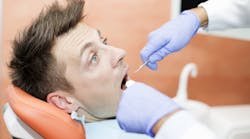A few months ago, I was at home and remember asking my husband to blow out a candle I was burning in the next room because it smelled terrible. I thought it was the candle and never gave it another thought.
The next morning, I couldn’t smell anything. Inhaling deeply into my mouthwash, shampoo, and my dog’s ears resulted in absolutely nothing. That day, I was tested for coronavirus and, sure enough, I was positive. My only real symptom was anosmia, which has been, for the most part, a minor inconvenience. In fact, it actually came in handy once when I had a patient who decided to take a swim in cologne before coming into the office!
Months have gone by, and I’ve pretty much gotten used to having no sense of smell. I’ve tried everything—xylitol nasal sprays, inhaling essential oils to try to retrain my senses,1 detoxifying diets, and I am taking all of the supplements to reduce inflammation. As I said, my loss of smell has been a minor inconvenience. Until now.
The good news is that what I am currently experiencing is supposed to be an indicator that my sense of smell is returning. The bad news is that my minor inconvenience has turned into an extremely unpleasant situation—my anosmia has evolved into parosmia.
What is parosmia?
According to the National Institutes of Health (NIH), parosmia is “a change in the normal perception of odors, such as when the smell of something familiar is distorted, or something that normally smells pleasant now smells foul.”2 In other words, everything I smell and taste is extremely unpleasant. If I smelled a rose and a piece of bacon, they would smell the same and both smell terrible. Same goes for taste; most things I taste are unbearable. This includes toothpaste. While people can experience parosmia to varying degrees, it generally lasts two to four weeks3 for most people.
While patients will likely have to sample foods that they can deem edible during this time, it is important for dental professionals to understand that this can vastly limit patients’ tolerance to many dental products. I have found one of my all-time faves—mint—to be intolerable.
My parosmia has lasted over a month and counting, so finding dental products that are tolerable and offer therapeutic benefits is essential. To promote ideal oral heath, it’s essential to reduce bacterial levels, promote a favorable oral pH, and promote mineral exchange between saliva and teeth (fluoride, calcium, and phosphate).
I have found a few products to be pleasant during this very unpleasant time:
• Revitin Toothpaste:4 Revitin is a prebiotic toothpaste that is intended to support a healthy oral microbiome. It contains natural ingredients and vitamins C, D3, E, and K2. A healthy microbiome will reduce the risk for caries, periodontal disease, and halitosis. In addition, it tastes like an orange creamsicle!
• MI Paste/MI Paste Plus:5 MI Paste is a topical product that is applied after brushing and flossing (and before I place my orthodontic aligners at night) that floods the saliva with Recaldent (calcium, phosphate, and a milk-derived protein) to reduce the risk for dental caries and minimize dentinal sensitivity. MI Paste Plus additionally contains 900 ppm fluoride. MI Paste also contributes to neutralizing oral pH; MI Paste can raise the oral pH for 48 hours, and MI Paste Plus can raise oral pH for up to 96 hours. Recaldent will also infiltrate dental plaque, creating a healthier oral environment. I would normally prefer mint, but there are some flavors that are really working for me right now, including strawberry and tutti-fruitti.
• BasicBites:6 BasicBites are basically candy with benefits! It is a caramel- or chocolate-flavored soft chew that contains arginine bicarbonate and xylitol. Arginine bicarbonate raises the oral pH, and xylitol is bacteriostatic. One BasicBite is 15 calories and is gluten- and dairy-free. BasicBites have had very high acceptance among my patients; it’s great for patients with xerostomia and those who are at risk for dental caries. Under normal circumstances, chocolate would be my go-to, but for now, the caramel flavor is the highlight of my day!
As dental professionals, being familiar with parosmia and offering suggestions to keep our patients healthy during this challenging time can be extremely beneficial.
Editor's note: Originally posted in 2021 and updated regularly
This article first appeared in Through the Loupes newsletter, a publication of the Endeavor Business Media Dental Group. Read more articles and subscribe to Through the Loupes.
References
- Froum S. Olfactory training and COVID-19-related loss of smell. Perio-Implant Advisory. March 8, 2021. https://www.perioimplantadvisory.com/clinical-tips/article/14198911/olfactory-training-and-covid19related-loss-of-smell
- Definition of parosmia. National Institutes of Health. https://www.nidcd.nih.gov/glossary/parosmia
- Gillespie C. Parosmia is a post-COVID side effect that distorts your sense of smell—and more people are experiencing it. Health.com. March 15, 2021. https://www.health.com/condition/infectious-diseases/coronavirus/parosmia-covid
- Revitin natural toothpaste. Revitin Oral Care. https://www.revitin.com/
- MI Paste and MI Paste Plus. GC America. https://www.gcamerica.com/products/preventive/MI_Paste/index.php
- BasicBites. Ortek Therapeutics. BasicBites.com. https://www.basicbites.com/







